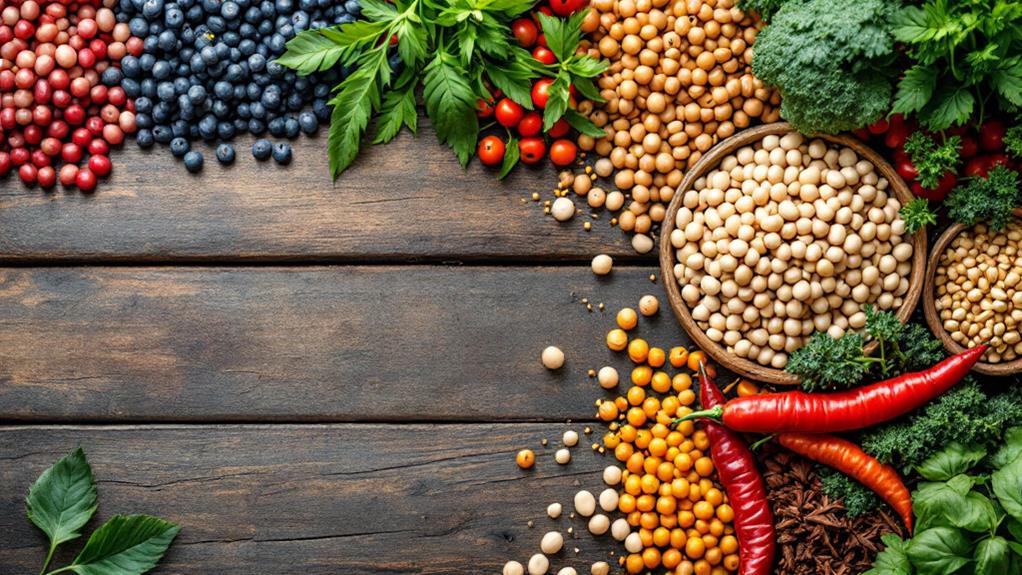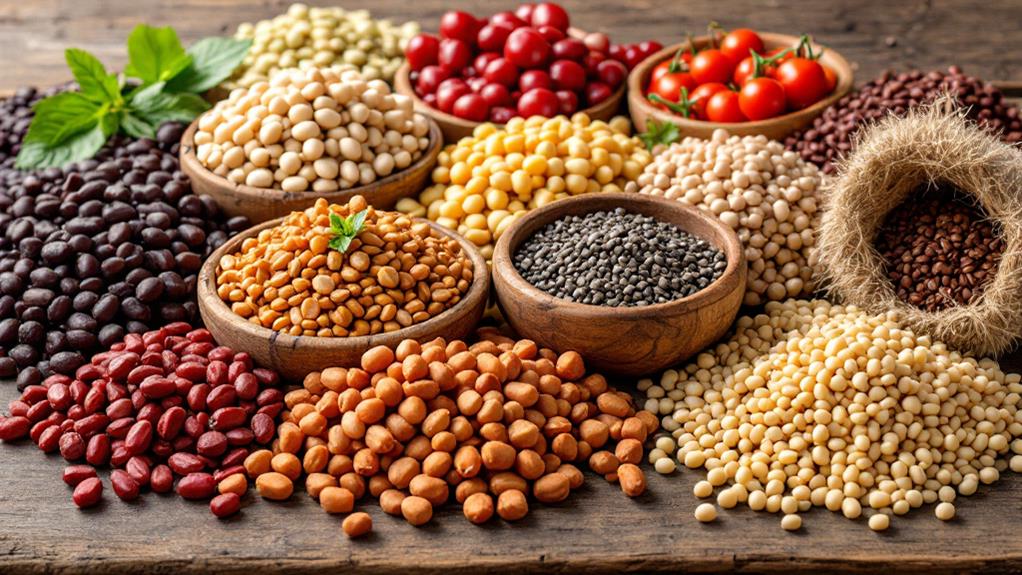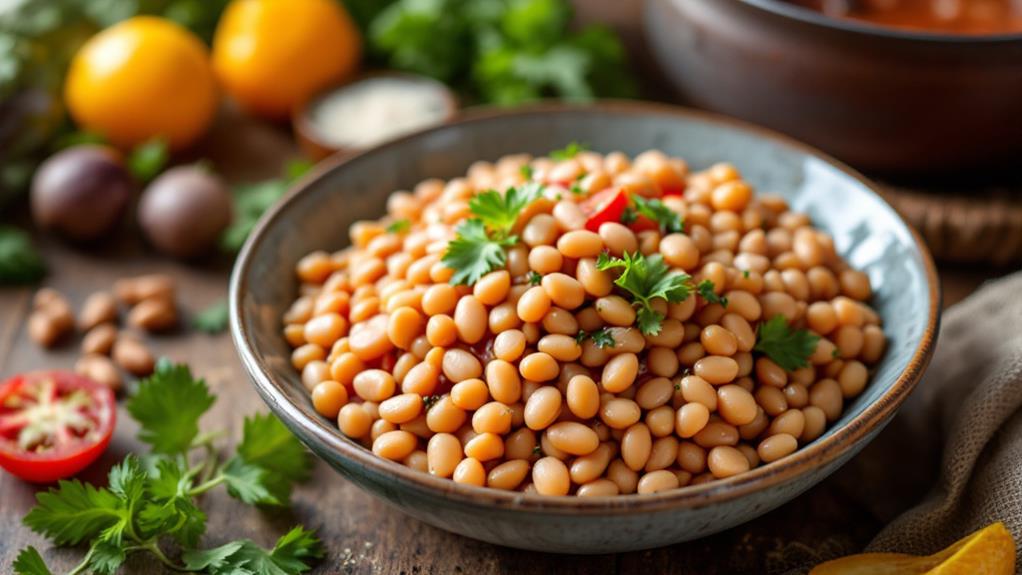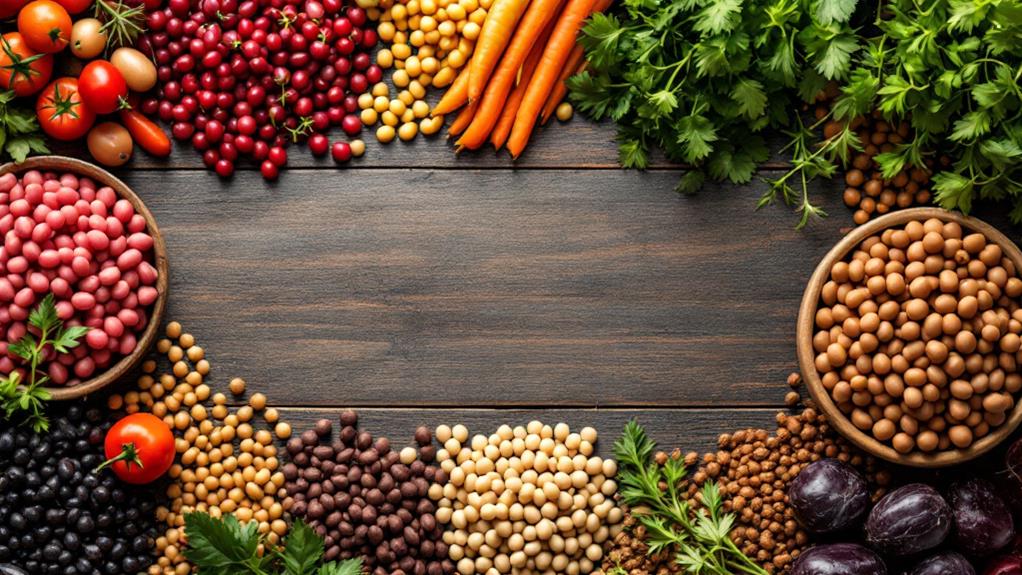Everything You Need to Know About Black Beans: A Nutrient-Rich Legume
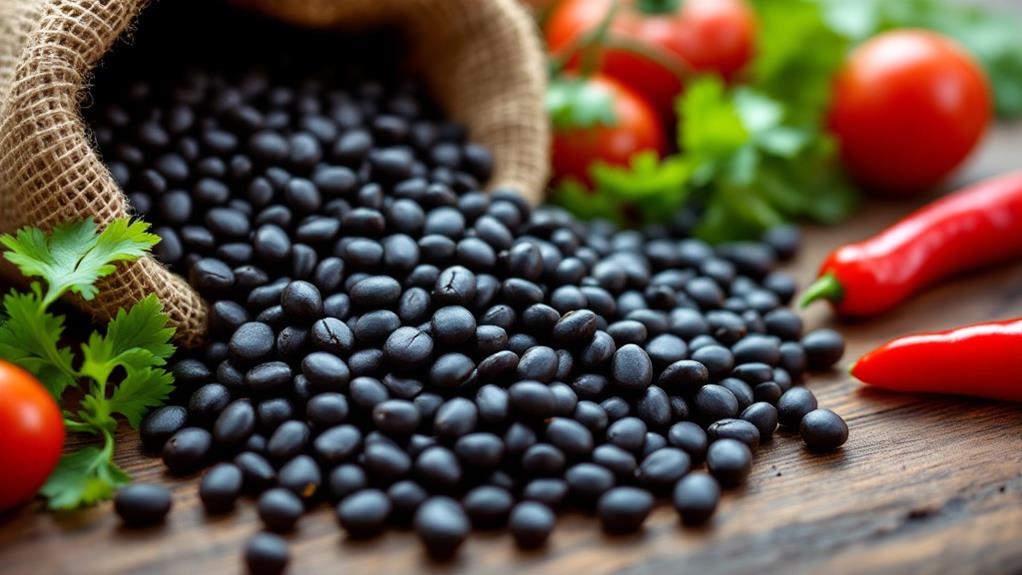
Black beans are a nutrient-dense legume that can transform your diet with their health benefits. They're low in calories yet packed with fiber and protein, making them perfect for weight management and plant-based diets. You'll also get vital minerals like iron and magnesium, plus powerful antioxidants such as quercetin. To make them more digestible, soak them prior to cooking. This versatile ingredient works in soups, salads, and even sweet recipes like brownies. Though similar to pinto beans, black beans offer more protein and fiber. Keep exploring to uncover their culinary versatility and how they enhance heart and digestive health.
Nutritional Benefits
Black beans are a powerhouse of nutrition, offering multiple benefits in just a half-cup serving. With around 114 kilocalories, they're an excellent low-calorie, nutrient-dense choice for your meals. The impressive nutritional content of black beans includes high levels of dietary fiber—7.5 grams per serving—which aids digestion and keeps you feeling full longer. This makes them an ideal supplement to any diet, especially if you're looking to manage weight or improve digestive health.
In addition to fiber, black beans pack approximately 7.62 grams of protein per half-cup, making them a fantastic option for enhancing your daily protein intake, particularly if you follow a plant-based diet. They're also rich in vital minerals like iron, magnesium, and calcium, which support bone health and aid in oxygen transport throughout the body.
Moreover, black beans are loaded with antioxidants such as quercetin and anthocyanins. These compounds play a significant role in reducing inflammation and potentially lowering the risk of chronic diseases, including heart disease and certain cancers. By incorporating black beans into your diet, you're supporting your heart health and general well-being, thanks to their robust nutritional profile.
Health Advantages
In recent years, there's been a growing appreciation for the health advantages of incorporating black beans into your diet. The black beans health benefits are impressive, making them a valuable supplement to your meals. Packed with antioxidants, they help combat oxidative stress, lowering your risk of chronic illnesses like heart disease and certain cancers. Their high fiber content, about 7.5 grams per half-cup, not only aids digestion but also plays an important role in reducing cholesterol levels, which is significant for heart health.
Managing your weight becomes easier with black beans as they promote a feeling of fullness, helping you avoid overeating. For those concerned about diabetes, black beans can stabilize blood sugar levels, further lowering the risk of developing type 2 diabetes. They're also rich in crucial nutrients like iron and magnesium, supporting bone health and oxygen transport in your body.
Consider including black bean soup to your menu for a delicious and nutritious meal. This simple dish can improve your diet with its abundant health benefits while keeping you satisfied. With all these advantages, it's clear why black beans have become a favored choice for health-conscious individuals.
Cooking Techniques
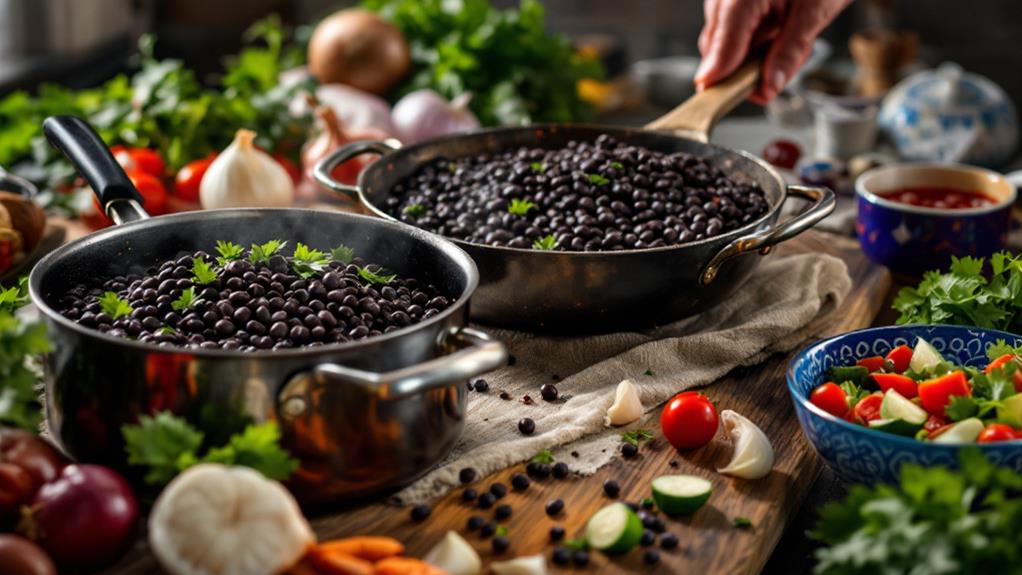
When preparing black beans, a few essential cooking techniques can make a notable difference in both flavor and texture. Start by soaking dry black beans overnight or use a quick-soak method: boil them for 2 minutes, then let them sit for a couple of hours. This step not only reduces cooking time but also decreases oligosaccharides, improving digestibility. After soaking, remember to drain and rinse the beans thoroughly before cooking them in fresh water.
To cook, bring the beans to a boil, then lower the heat to a simmer for about 2 hours, stirring occasionally until they're tender. Avoid seasoning with salt or spices until after cooking; this helps guarantee even flavor absorption and prevents toughening the skins. If you're using canned black beans, they're already precooked and convenient. However, rinsing them under cold water can considerably reduce their sodium content, enhancing their nutritional benefits.
These cooking methods, particularly boiling and simmering, enhance the beans' digestibility and make them a flexible ingredient in different recipes. Regardless of your aim for a hearty stew or a revitalizing salad, these techniques will guarantee your black beans are both delicious and nutritious.
Dietary Considerations
Taking dietary needs into account, black beans offer both advantages and challenges. They're an excellent source of protein and dietary fiber, with about 7.62g of protein and 7.5g of fiber per half-cup serving. This combination helps you feel full and supports digestive health. However, they're also high in carbohydrates, with approximately 20.39g per half-cup, which might not fit well into low-carb diets. If you're watching your carb intake, you'll want to take portion sizes into account and balance them with other low-carb foods.
One challenge with black beans is their antinutrient content, which can hinder nutrient absorption. Thankfully, soaking and boiling can greatly reduce these levels, making the beans more digestible and enhancing nutritional value. You might also notice some gas and discomfort after eating black beans, as they contain oligosaccharides. To minimize these effects, gradually increase your intake, giving your digestive system time to adjust.
For ideal nutrition, it's essential to maintain variety in your diet. Pair black beans with other food groups to guarantee a balanced intake of nutrients. By being mindful of these factors, you can enjoy the health benefits that black beans provide while managing any potential downsides.
Black Beans vs. Other Beans
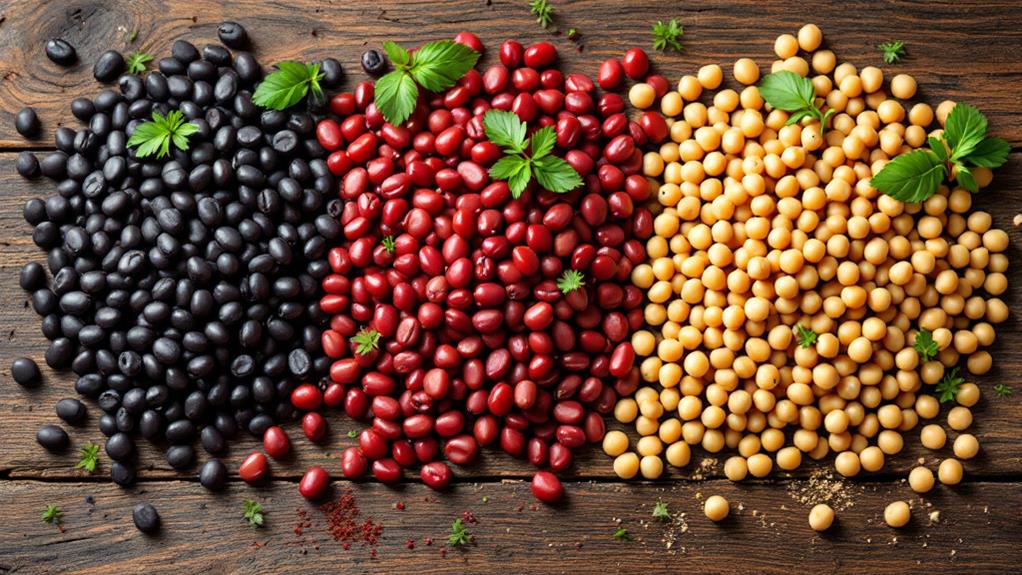
Investigate the world of legumes, and you'll quickly see how black beans stack up against other beans. When you compare black beans to pinto beans, their nutritional profiles are remarkably similar. Both offer a hearty dose of health benefits, but black beans have a slight advantage in protein and fiber, with 7 grams of protein and 8 grams of fiber per half-cup serving. This additional enhancement can be particularly beneficial for a high-protein, high-fiber diet.
Black beans are also packed with antioxidants, specifically anthocyanins, which play an essential role in fighting free radicals. On the other hand, pinto beans shine with higher levels of folate, calcium, and copper, adding their own unique health benefits to your meals.
In terms of culinary uses, black beans' mild, meaty flavor and creamy texture make them a favorite in Latin dishes, while pinto beans' earthy taste fits perfectly in refried beans and chili con carne. If you're choosing between dried black beans and canned varieties, keep in mind that dried ones typically offer more nutritional density. However, canned options remain a convenient choice, especially when rinsed to reduce sodium content.
Culinary Applications
Black beans frequently find their way into a wide range of dishes, bringing robust flavor and nutritional benefits to the table. Their high protein and fiber content make them a flexible ingredient in numerous culinary applications. You can incorporate black beans into salads, soups, stews, and tacos, where they add depth and nutrition. Pairing them with grains like rice or quinoa not only improves flavor but also creates a complete protein source, ideal for plant-based diets.
In Latin cuisine, black beans are a staple. They're crucial in dishes like Feijoada, a Brazilian stew, and often accompany corn tortillas. For a quick meal, canned black beans are a convenient option. Just remember to rinse them to reduce sodium and improve digestibility.
Here are a few ways you can use black beans:
- Salads: Toss them in with your favorite veggies for added protein.
- Soups: Add them to broth-based soups for richness.
- Grains: Mix with rice or quinoa for a complete meal.
- Mashed: Use them as a spread or in dips.
- Sweet Treats: Experiment by adding them to brownies or smoothies.
These culinary applications showcase their adaptability and nutritional prowess.

